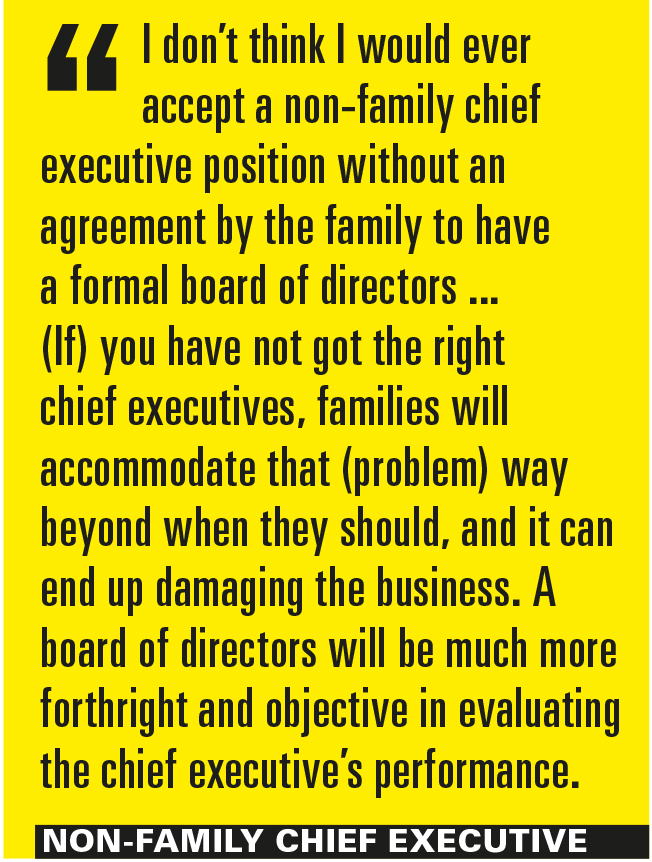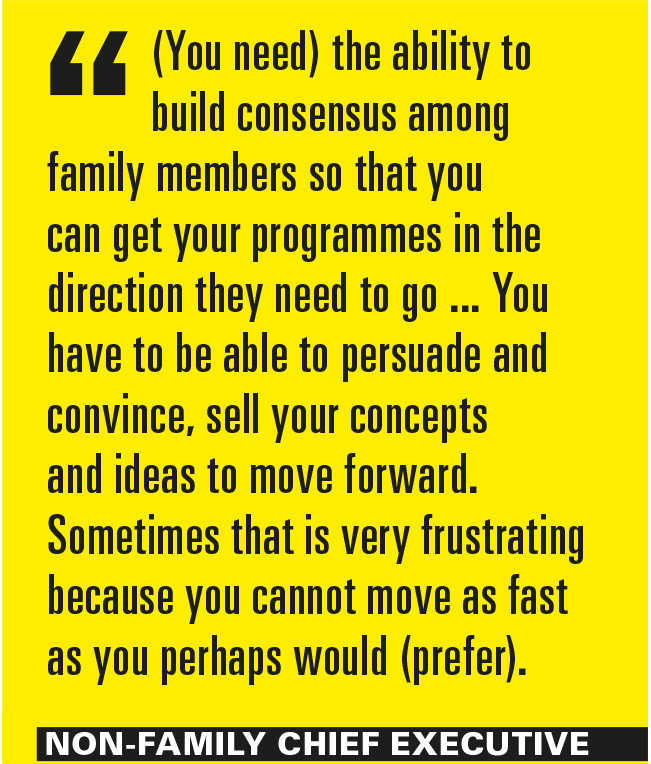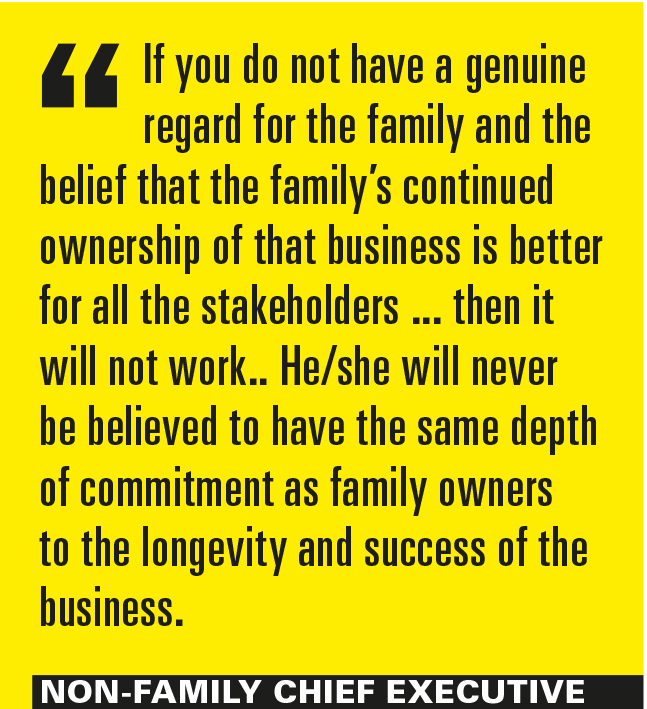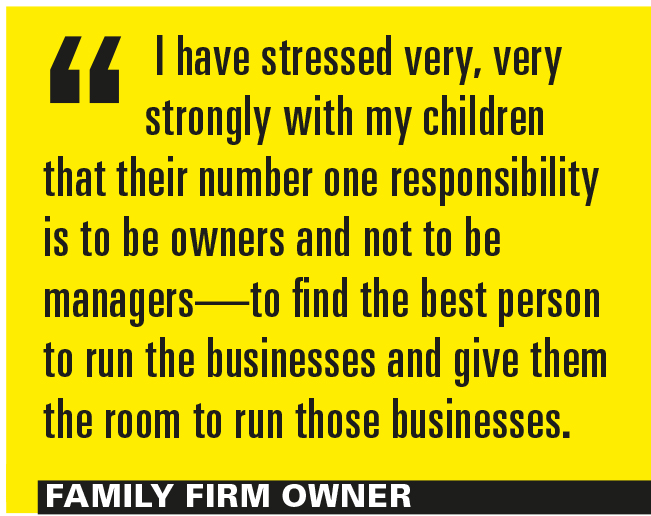FB Academy: Are we a family business without a family chief executive?

In our new series, FB Academy, giving practical 'how-to' advice to families, Andrew Keyt, clinical professor at Chicago's Loyola University, likens bringing on a non-family leader to Thanksgiving.
The traditional model of family business succession is built on a parent passing leadership of the family company to one of their children. As the Millennial generation comes of age, family businesses are increasingly turning to non-family members to lead their family companies.
As family businesses grow in size and complexity they will need to lean on the skill-sets of non-family members to meet the challenges of a dynamic market place. The natural evolution of this is the move towards “professionalisation” of management. Too often this term is used to imply that family members are not capable of building or employing sophisticated management techniques, but in the context of this article, we will use this term to describe management and governance by highly qualified individuals who are not the patriarch or matriarch.
This shift to non-family management has arisen for a variety of reasons. Growing up in the shadows of vaunted entrepreneurs can make it difficult for the next generation to find a path to leadership that is true to who they are. My conversations with the next generation have revealed several reasons why families choose to look outside the family for leadership of the business.
Reasons include:
• The next generation isn't ready for leadership
• The next generation isn't interested in leadership
• The next generation isn't qualified for leadership.
But this does not mean that a family must sell the family business. Non-family chief executives are increasingly a viable option.
The biggest change in mindset for a family to make in this process is to shift from a management to an ownership mentality. Making this shift requires the family to be clear about the difference between the role of owner and the role of manager. As owners they must provide a clear sense of values, mission, and vision to guide the non-family chief executive and the management team in creating a viable strategic plan for the business.
The crux of an ownership mentality is building a culture of strong governance. The four factors that we will share here are based on work done with my colleagues, Dr Joe Astrachan and Dr Tim Blumentritt.

Four factors in successful relationships between family firms and non-family chief executives


Business acumen
Make no mistake: non-family chief executives must be highly capable performers, regardless of the means whereby they attain their positions. But family firms expect character and integrity as well. In fact, when hiring and governing outside executives, family businesses tend to rely more on trust and comfort than they do on structured control mechanisms.


A strong board
First, a strong board acts as a buffer between the family and the non-family leader. A family can deliver too many or too few opinions about what members expect the non-family chief executive to achieve. While the voices of stakeholders and shareholders must be given weight, no chief executive could reasonably spend time, energy, or social capital responding to every family member or constantly defending his/her strategic decisions. As one non-family chief executive shared…

 Comfort with family dynamics and values
Comfort with family dynamics and values
While non-family chief executives are hired to move the firm forward, they also must be adept at navigating interpersonal dynamics while gathering support for their business decisions. Successful non-family chief executives will share the family's values and will strive to understand what the family expects of them, while avoiding entanglements in family politics.

 A family council
A family council
A family council is a representative governance group elected to deal with family issues, draft family policy, and adjudicate and execute charitable and other distributions. A council provides a structured forum for airing family issues and opinions about business activities in ways designed to minimise impact on the firm's competitive performance and intrusion on the chief executive's role.
Successful non-family chief executives often develop a heartfelt affinity for and identification with the family. Non-family chief executives who lack that affinity—in favour of an exclusive focus on business performance and compensation—will likely experience a disappointing tenure.
The family can improve the non-family chief executive's odds for delivering solid performance by using a family council structure to insulate the chief executive from the potentially messy process of distilling individual preferences into a coherent set of objectives. These objectives and expectations can then be clearly communicated to the chief executive.
During a generational transition, a non-family chief executive may be asked to help instill in younger family members the skills important for eventual ascension to the chief executive position. Successful non-family chief executives in a mentorship role will require a very clear sense of their place in the family firm's history, and a willingness to be subservient to the longer-term processes of which they are a part.

Challenges in selecting a non-family chief executive
To begin evaluating candidates, a family can develop a framework by analysing its life stage and current needs. A company facing a business crisis may require a chief executive with certain skills or experiences that family members do not possess. A business seeking a leader to act as a bridge between generations will likely want a candidate who can also mentor the future family chief executive. While a bridge chief executive may come from among the long-time employees in the firm, a crisis chief executive likely will not. Still other families may chose to hire a permanent non-family chief executive, reducing or eliminating their participation in active management in favour of their ownership role.
There is no doubt that non-family chief executives are an emerging trend in the field of family business. Our findings show that family businesses can structure themselves and govern their non-family chief executives to bolster the non-family chief executive's ability to move the firm forward while interacting with the family in productive and rewarding ways.
We suggest thinking of successful non-family chief executives as guests at Thanksgiving dinner who are asked to prepare the turkey. They are invited into something dear to the family and are trusted with a key part of its activities, but they remain guests. The best non-family chief executives will have the personalities, skills, and motivation to thrive in such settings—generating financial and emotional rewards for all involved.






